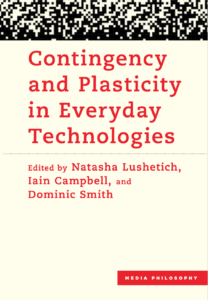Research outputs 2022
The Anarchive of Indeterminate Artistic Practices
An ephemeral repository without centrally organised memory
Created by Natasha Lushetich & Adam Lockhart. Developed by Waterfront Digital
Contingency and Plasticity in Everyday Technologies, Rowman and Littlefield Media Philosophy, 2022
Edited, with an introduction by Natasha Lushetich, Iain Campbell & Dominic Smith

Technology is a host of social, material, and epistemic transformation techniques, tools, and methods. The common perception of digital technology today is that it is determined, even overdetermined. This volume suggests a different view: the digital is indeterminate. Mobilising insights from philosophy, art and architecture theory, mathematics, computer science, and anthropology, it situates digital indeterminacy within the wider context of material and immaterial processes, causations, triggerings, and their performative working. The book’s tripartite structure reflects technology’s inherent capacity to transform knowledges, practices, and time. Part I: Social-Digital Technologies juxtaposes arguments for machinic indeterminacy to those of overdetermination in blockchain, cognitive augmentation, and digital ideology. Part II: Spatial, Temporal, Aural, and Visual Technologies delves deeper into received ideas about technologies for building spatial structures, manufacturing instruments, and constructing the visual space. Part III: Epistemic Technologies analyses the use of plasticity in cognitive science, contingency in thinking habits, ontogenesis in experimental computing, and divination techniques with an inbuilt margin of indeterminacy.
For more information:
https://rowman.com/ISBN/9781538171578/Contingency-and-Plasticity-in-Everyday-Technologies
Rhythm and Signification: Temporalities of Musical and Social Meaning
Iain Campbell & Peter Nelson, Angelaki 27:5 (2022): 56–78.
Rhythm is generally taken to refer to a temporal pattern of events. Yet in recent years, across diverse fields in the arts, humanities, and social sciences, it has come to serve as the conceptual marker for a wide range of new approaches to understanding relations and relationality, following most explicitly from the late work of Henri Lefebvre. This article explores the temporal aspect of such relational thinking, in particular asking how time is implicated in relations, and how it can be meaningful in those relations. The sense of time is surveyed from the perspectives of both cognition and metaphysics as well as with reference to music scholarship and social theory, and key threads are drawn, from the writings of Gaston Bachelard and Charles Sanders Peirce in particular, in order to suggest that time can be a sign, and that the signifying properties of rhythm have critical social consequences.
For more info: https://www.tandfonline.com/doi/full/10.1080/0969725X.2022.2110395